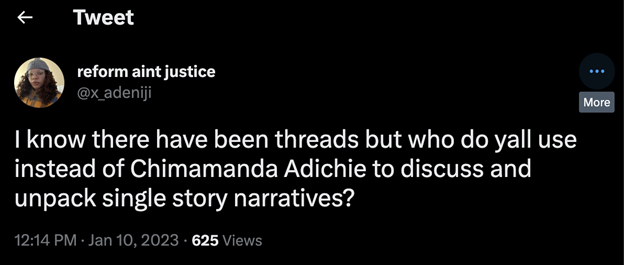Before the spring semester started in January, I asked education Twitter for resources to unpack single-story narratives.
As a doctoral candidate and teaching fellow in education, I teach preservice teachers, and my current course centers unpacking their intersecting identities before entering the classroom. Additionally, the course centers conversations around race, gender and sexuality, languaging, and co-creating oppressive-free spaces for all students to exist freely. Therefore, at the beginning of every semester with preservice teachers, I intentionally take the time to co-construct community, which involves deconstructing the dangers of single stories. In the past, I used Chimamanda Adichie’s TED talk “The Danger of a Single Story.” Adichie discusses how her college roommate assumed Nigerians and people from Africa lived in huts or didn’t have access to essential resources. The roommate’s views exemplify how single stories reinforce stereotypes and cause harm.
Why It’s Problematic
I’d asked for suggestions because Adichie’s problematic and harmful views on trans women had surfaced a couple of years ago. While Adichie labels herself as a feminist, she believes trans women cannot fully understand the struggles of AFAB women. As a queer, Black teacher, using anti-trans and anti-queer literature goes against my core values of creating and upholding pro-Black, queer community spaces.
Windows, Mirrors, and Glass Sliding Doors
When I asked education Twitter for resources, they delivered. A Twitter user reminded me of another Black teachers thread which led me to Grace Lin’s 2016 The Windows and Mirrors of Your Child’s Bookshelf TEDxTalk. Lin addresses the lack of intersectional texts in her elementary and library classrooms. This propelled her to author children’s books that highlight Asian Americans as protagonists and celebrate their rich cultural knowledge.
But more importantly, Rudine Sims Bishop must be acknowledged and credited for naming why mirrors, windows, and glass sliding doors are essential in literature for Black, Asian, and other children of color.
Sims Bishop (1990) states, “When children cannot find themselves reflected in the books they read, or when the images they see are distorted, negative, or laughable, they learn a powerful lesson about how they are devalued in the society of which they are a part” (p. 1).
A few key takeaways:
- Be intentional and research who you include in your classrooms and school libraries. To openly and willingly share media and texts from anti-trans, anti-queer, and oppressive authors is harmful. But, if you do share it, hold space to have conversations about the author’s harmful views and a path to oppressive-free realities.
- Laws and policies throughout the United States increasingly limit and ultimately ban books about Black, queer, Indigenous people, and our rich cultural heritage of every intersection. Your students deserve to see themselves represented in media and literature beyond patriarchal and heteronormative lenses.
After watching Lin’s TedxTalk at the beginning of the semester last month, I followed up with a few discussion questions:
- How do the stories she read as a child affect the stories she writes now?
- It is impossible to talk about the single story without discussing power. In what ways is storytelling a form of power?
- What connection can you make to the understanding of your identity? What can we do as teachers/educators to combat “single stories”?
These moments within K-12 classrooms and teacher preparation programs are opportunities to thoroughly and routinely research the curricula, media, and literacy used within the educational spaces you occupy.

Danelle Adeniji is an advanced doctoral candidate in the PhD Curriculum and Instruction Studies program at the University of North Texas. Their research is situated at the intersection of queer, elementary, and urban education. The core values that guide their work are freedom, pro-Blackness, community care, pro-queer Black folks, joy, justice, and storytelling. They believe that the narratives of Black, Indigenous, and other communities of color must be centered within pedagogical and research practices.
It is the policy of NCTE in all publications, including the Literacy & NCTE blog, to provide a forum for the open discussion of ideas concerning the content and the teaching of English and the language arts. Publicity accorded to any particular point of view does not imply endorsement by the Executive Committee, the Board of Directors, the staff, or the membership at large, except in announcements of policy, where such endorsement is clearly specified.

